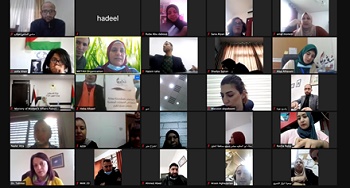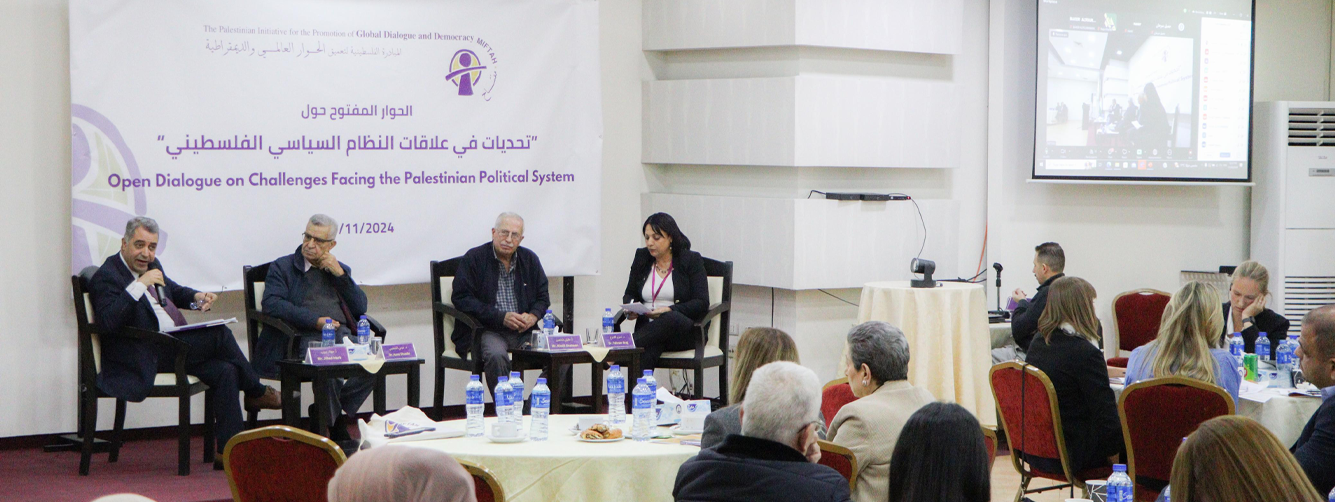
Ramallah – Under the auspices of Dr. Amal Hamad, Minister of Women’s Affairs, and as part of the “Shufuna” project, MIFTAH launched its ‘’Shufuna” strategy for integrating women and youth in decision-making positions and at the national reconciliation table during a meeting on November 26.
MIFTAH Executive Director, Dr. Tahreer Araj opened the meeting, saying the “Shufuna” platform for active representation and participation of women at the national dialogue table and in decision-making positions is a continuation of efforts to promote the leadership role of women and youth. She said it also aims to push for these sectors’ involvement in political decision making and formulation of public policies along with their representation in national dialogue circles. Araj said through its program “Policy Dialogue and Good Governance”, MIFTAH was able to set the tone for a climate of interactive dialogue for women and youth from various backgrounds, professions and political affiliations at the grassroots and elite levels, in order to discuss the challenges that hamper their integration in political life. It also allowed them to discuss the reasons behind the absence of women and youth in national reconciliation and unity talks.
Araj continued, “MIFTAH, in partnership with UNDP and “Wattan” Media Network, seeks to provide democratic dialogue spaces on the topic of women’s political participation in the Palestinian socioeconomic context. This includes discussing challenges, such as the extent of political will for reforming laws and legislation in combatting the patriarchal male culture in Palestinian society and for developing policies that guarantee gender equality and justice through organizing a group of interventions.”
Sufian Mshasha, special deputy representative for UNDP then delivered a speech as funder and project partner, saying that unlike other projects, “this was self-funded, which heightened our interest in the strategy’s launching, which is not the end of the road, but an accumulation of past activities. We feel this strategy sets the basis for continuous action to promote a real role for women in decision-making and not only to address the political division and participation in reconciliation committees. Hence, the “Shufuna” strategy is a launching point that cannot be assessed only by being launched but through criteria on the strategy’s effectiveness and the extent to which we were able to create real participation.”
Ahlam Al Wahsh, who spoke on behalf of “Shufuna”, said they held several awareness and consultation meetings, which culminated in the formation of a platform that included a number of women and youth. “We aspire to reach decision-making positions so we can have a role at the reconciliation and dialogue table because women have been marginalized and excluded from these places. We base this on the premise that rights are indivisible and that principles unite us, most importantly the principles of freedom of opinion and expression, guaranteed by our Palestinian resistance history towards active representation and participation of women at the national dialogue table and in decision-making positions. This is a women’s and youth interactive platform between the West Bank and Gaza Strip , which we hope to expand to social media platforms as well. We insist on being visible and that our women and youth can reach you through both real and virtual interactive arenas.”
Meanwhile, Minister of Women’s Affairs Dr. Amal Hamad thanked MIFTAH for its work in addressing priorities and needs and having a clear vision on the challenges facing Palestinian women. In her presentation, Hamad broached several issues, including the importance of partnership between the government and civil society as a partner with an active role in needs and priorities-based policies, programs and interventions. She said this was the foundation on which the Ministry of Women’s Affairs operates with civil society institutions. In this regard, she maintained that the Ministry of Women’s Affairs addressed the topic of political partnership, pointing to the sectoral strategy of the ministry, which is primarily aimed at empowering women and helping them reach decision-making positions in all PLO bodies and unions and within factions and parties. These parties, she maintained, must take the initiative in implementing PNC and Central Council decisions regarding the women’s quota, which could be achieved through working on laws and legislations.
This was followed by a presentation of Shufuna’s strategic plan by Hatem Taha, member of the platform. He presented Shufuna’s vision, which revolves around real representation and active participation of Palestinian women in national dialogues and decision-making positions. He also shed light on the most important objectives of the plan, which confirm women’s active participation in democratic transfer of power, representation in decision-making positions, in national reconciliation and ending the division.
Shadia Abu Sultan and Yassin Abu Odeh then presented the most important virtual and face-to-face initiatives planned by the platform through several meetings it held in the West Bank and Gaza Strip. The most standout initiate was the “Shufuna” national reconciliation bus and the friendly football match between Palestinian factions.
Regarding the values and principles adopted by the strategy, Sami Sa’aee explained that Shufuna's strategy is based on belief in the values of societal peace, democracy, freedom of opinion and expression and all values that promote citizenship, respect for pluralism, ability for free thought and constructive criticism, sustainability of leadership skills development and leadership of an initiative for change towards reaching the aspired goal of the Shufuna platform.
Furthermore, Wijdan Buheisi showcased the most important pillars of the Shufuna strategic plan, namely the Palestinian Declaration of Independence and the strategic approaches in the national policies agenda in addition to the approaches of the international community in empowering women and combatting all forms of gender-based discrimination.
The presentation also included an analysis of women’s situation during the division. Rasha Nofal said the Shufuna strategy confirmed that women are the most affected by the division at the economic, social and political levels. The political division, she maintained, poses a direct threat to the Palestinian right to life, with 1,098 Palestinians who lost their lives between 2007 and 2017 due to internecine violence, the proliferation of weapons and deaths in detention centers in addition to other unnatural causes of death with the exception of martyrs who died as a result of Israeli violations. The abovementioned number is divided as follows: 11% of deaths (or 127 cases) occurred in the West Bank while the remaining 89% took place in the Gaza Strip (971 cases).
Moreover, the presentation included statistics on women’s participation, which indicated that although women comprise 49% of the population of Palestine and head 11% of Palestinian households, their role in public political life and at the national dialogue table was clearly absent.
Interventions and recommendations
One of the most significant interventions was made by journalist Reem Omari from the Wattan Media Network in which she reiterated Wattan’s objectives in promoting women’s participation and representation in various political arenas and sectors. She said the network believes in the need to focus on the issues of marginalized sectors such as women and youth. She continued that this was realized through the “Shufuna” interventions that included several multimedia talk shows, short videos, radio spots and messages through social media in addition to online petitions and polls. Shufuna’s main program in its first season reached approximately four million viewers. Also through its media campaign, “Wattan” introduced the “Shufuna” platform by covering its activities and news. In addition, it discussed important issues that affect women’s participation, including religious discourse, representation in political parties in elections, student councils, unions and federations. “Wattan” also focused on the vital role of women in crisis management and hosting international influencers to introduce them to the Palestinian experience such as Palestinian-American activist Linda Sarsur. The highlight of the campaign was appointing Dr. Naser Al Qudwa as Shufuna’s ambassador to carry the campaign’s messages and recommendations to decision-makers at the political level.
At the end of the meeting, several interventions and recommendations were presented, all of which confirmed that the platform was a unique and pioneer experience meant to achieve the main goal of promoting women’s participation and empowering them at all decision-making levels. Other objectives, they agreed, include achieving social justice and equality, the need to form a committee for serious pressure and demands pertaining to women’s participation in reconciliation committees, conducting field visits to those in charge of reconciliation files in order to press them in that direction and to work on raising youth awareness to the importance of their role and participation in decision-making.
MIFTAH program director, Lamis Shuaibi said the launch day for the Shufuna strategy was a success for all the partners’ efforts towards more community interaction. She added that the platform embodies national and social unity within a unified rather than factional framework. “What we need right now is for the platform to be able to lead itself and to be able to determine its own tools and executive plans.” Shuaibi continued that MIFTAH and its partners were willing to offer every possible help within this open space, not only through social media but also through actions on the ground.”
Furthermore, MIFTAH project manager Najwa Yaghi-Sandouka said the meeting falls under the efforts of MIFTAH’s partner institutions in building a concept on the participation of Palestinian women given the importance of women’s role in building state institutions and impacting the formulation of public policies and national legislation. This, she said, is in response to the needs of various social components and in a bid to increase higher representation of women and youth within the Palestinian political system. Yaghi-Sandouka maintained that such efforts would contribute to institutionalizing citizenship rights for Palestinians on the grounds of equality, partnership, pluralism, respect for liberties and the achievement of human dignity.








